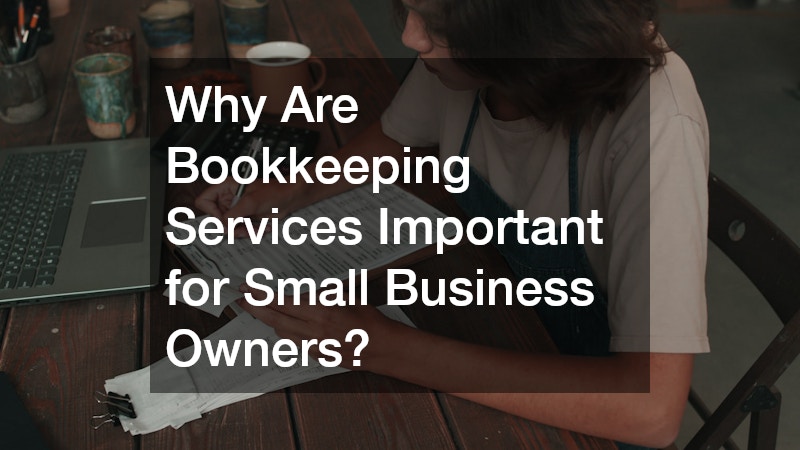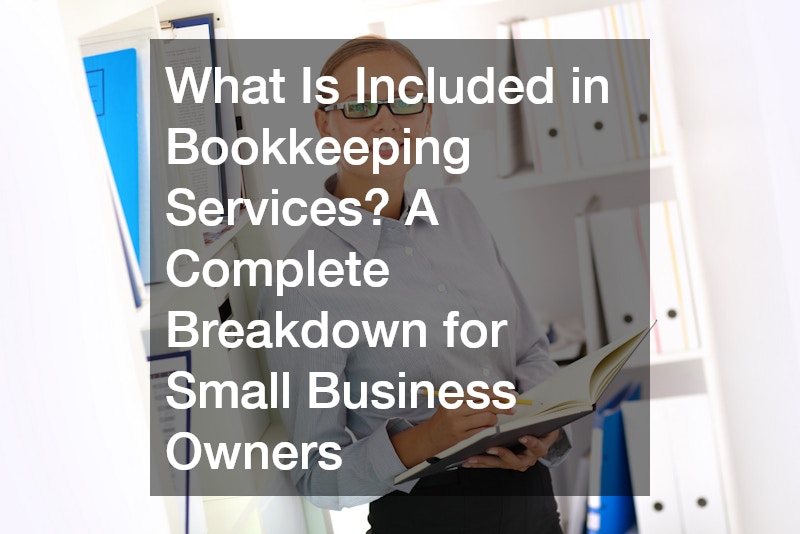Bookkeeping is the backbone of sound financial management, especially for small business owners who need clear visibility into their cash flow, expenses, and growth potential. But if you’re wondering what exactly bookkeeping services entail, you’re not alone. Many business owners assume bookkeeping is limited to tracking income and expenses. In reality, it includes a range of critical tasks designed to keep your business organized, compliant, and financially healthy.
In this article, we’ll explore the core services typically included in bookkeeping, explain how these services benefit your business, and touch on the difference between bookkeeping and accounting. Whether you’re hiring a professional or using bookkeeping software, this complete breakdown will help you know what to expect.
What Do Bookkeeping Services Typically Cover?
Bookkeeping services go far beyond just recording transactions. These services are designed to provide accurate, timely, and organized financial data so business owners can make informed decisions.
Here’s what’s typically included:
- Recording Financial Transactions
Every sale, purchase, payment, and receipt must be documented and categorized properly. This is the foundation of your financial records. - Bank and Credit Card Reconciliation
Monthly reconciliation ensures that your recorded transactions match your bank and credit card statements, helping detect errors or fraud early. - Accounts Payable and Receivable Tracking
Bookkeepers help manage outgoing bills and incoming payments. They track what you owe vendors and what customers owe you, so you stay on top of cash flow. - Payroll Processing Support
While not always included in basic packages, many bookkeepers assist with payroll calculations, tax deductions, and employee compensation tracking. - Expense Categorization
Bookkeepers tag transactions into appropriate categories for budgeting, tax prep, and financial reporting. This helps you understand where your money is going. - Financial Reporting
Monthly or quarterly reports, such as profit and loss statements, balance sheets, and cash flow statements, give a snapshot of your business’s financial health. - Tax-Ready Records
Your bookkeeper keeps your financial data organized and compliant, making it easier for your accountant to file taxes accurately and on time.
These essential services ensure that your business remains financially stable and audit-ready year-round.
Why Are Bookkeeping Services Important for Small Business Owners?

Bookkeeping isn’t just about compliance—it’s about control. Small business owners need access to up-to-date, accurate financial data to make strategic decisions. Without reliable bookkeeping, you’re essentially flying blind.
Here’s why bookkeeping services matter:
- Better Cash Flow Management
Knowing when money is coming in and going out helps you avoid overdrafts, missed payments, or missed opportunities. - Informed Business Decisions
With accurate records, you can decide when to expand, cut costs, or invest in new resources. - Audit and Tax Compliance
Organized books mean fewer headaches at tax time and lower chances of triggering an audit. - Time Savings
Outsourcing bookkeeping allows you to focus on growing your business instead of managing spreadsheets and receipts. - Business Growth and Loan Readiness
Investors and lenders often request financial statements. Good bookkeeping ensures you’re always ready.
Even if you have a small team or are operating solo, professional bookkeeping support can give you the peace of mind to grow your business confidently.
What Is Included in Bookkeeping Services? Understanding Service Levels
Depending on your business size and needs, bookkeeping services can vary in complexity. Here’s a breakdown of what you might expect from different service levels:
1. Basic Bookkeeping Services
Ideal for freelancers and startups, this level typically includes:
- Transaction entry
- Bank reconciliation
- Expense tracking
- Basic financial reporting
2. Full-Service Bookkeeping
A more comprehensive package suitable for growing businesses:
- All basic services, plus:
- Payroll processing
- Inventory tracking
- Accounts receivable/payable management
- Budgeting support
3. Online/Cloud Bookkeeping
Digital bookkeeping platforms like QuickBooks or Xero offer:
- Automated transaction syncing
- Real-time dashboards
- Cloud document storage
- Integration with invoicing and payroll apps
4. Bookkeeping with Advisory Services
Some firms offer insights alongside your numbers:
- Financial forecasting
- Cash flow projections
- Performance analysis
- KPI tracking
Understanding what level of service you need helps you avoid underpaying for essential tasks or overpaying for services you don’t use.
What’s the Difference Between Bookkeeping and Accounting?
Bookkeeping and accounting serve different purposes in managing a business’s finances. Bookkeeping is primarily concerned with the accurate and timely documentation of daily financial transactions. In contrast, accounting takes this recorded data and uses it to evaluate financial performance, interpret trends, and provide strategic insights for informed decision-making.
Here’s a simple comparison:
- Bookkeeping: Recording, categorizing, and reconciling transactions.
- Accounting: Analyzing, interpreting, and advising based on those records.
So while bookkeeping keeps your business organized and compliant, accounting turns that information into strategic insights. Both are essential, but they serve different purposes.
How to Choose the Right Bookkeeping Service Provider

When evaluating a bookkeeping service, don’t just compare prices. Consider the following:
- Industry Experience: Do they understand the unique needs of your industry?
- Scalability: Can they support you as your business grows?
- Technology Stack: Are they using up-to-date software and secure data practices?
- Communication: Will you get timely reports and updates?
- Customization: Do they offer tailored services or one-size-fits-all solutions?
A good bookkeeper becomes a trusted partner in your financial journey, so choose someone with the right mix of skills, tools, and business acumen.
Final Thoughts
Bookkeeping services include far more than just balancing a checkbook. From transaction entry and reconciliation to payroll support and financial reporting, these services ensure your business runs smoothly and stays compliant. By understanding what’s included in bookkeeping services, you can make informed decisions about outsourcing, hiring, or managing it yourself.
When paired with accounting, bookkeeping becomes an even more powerful tool that provides insight, clarity, and strategic direction, giving you the foundation to grow your business with confidence.

